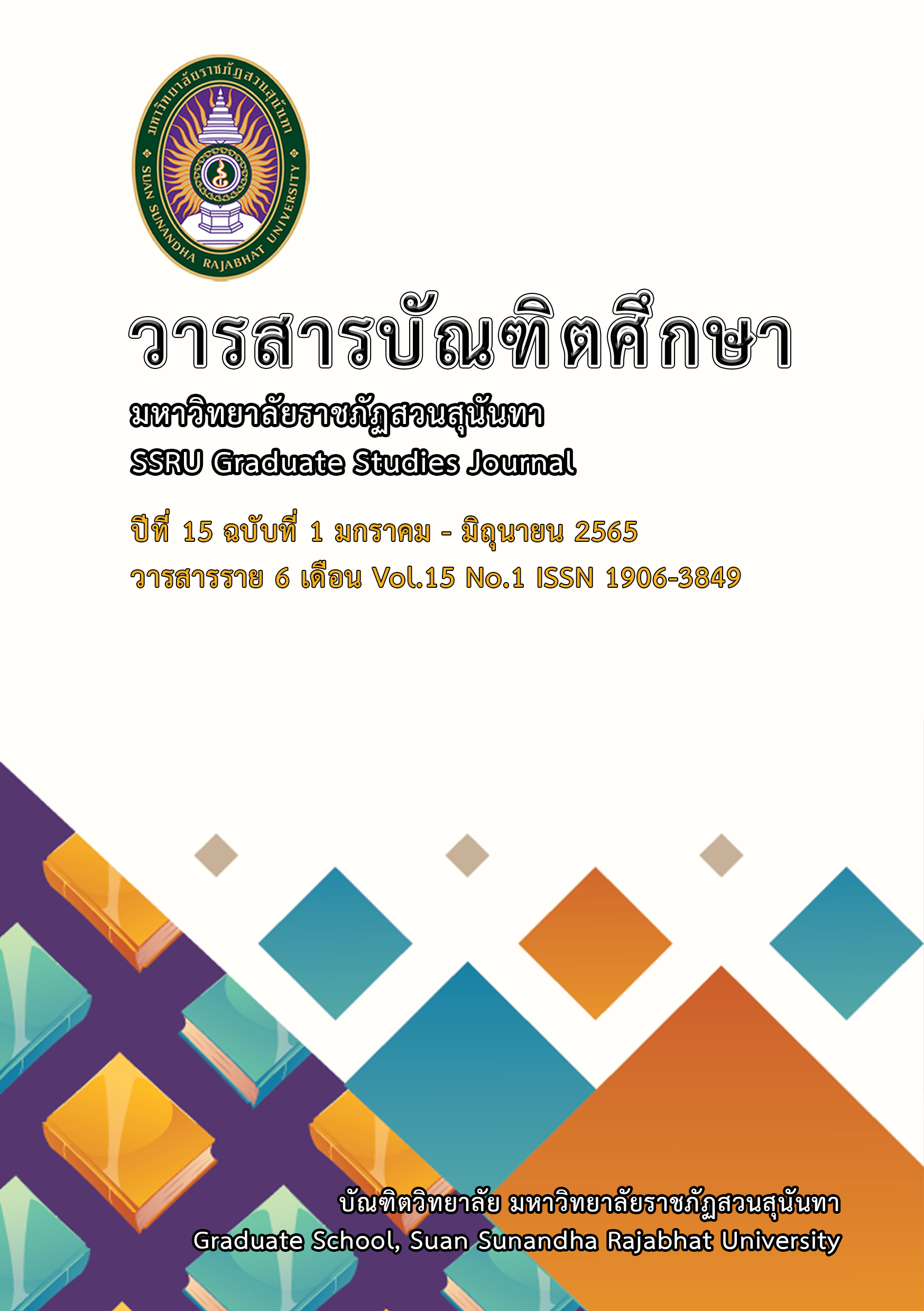รูปแบบความสำเร็จการเพิ่มศักยภาพและขีดความสามารถในการแข่งขันของธุรกิจ SMEs ประเภทอาหารในประเทศไทย
Main Article Content
บทคัดย่อ
การส่งเสริมความสำเร็จการเพิ่มศักยภาพและขีดความสามารถในการแข่งขันของธุรกิจ SMEs ประเภทอาหารในประเทศไทย เป็นการรองรับความต้องการของตลาดและพฤติกรรมของผู้บริโภคที่เปลี่ยนไปในการใช้เทคโนโลยีดิจิทัลและระบบออนไลน์มากขึ้น การวิจัยครั้งนี้ มีวัตถุประสงค์เพื่อ 1) ศึกษาระดับกลยุทธ์ทางการตลาด ความสามารถในการแข่งขันและศักยภาพผู้ประกอบการที่ส่งผลต่อความสำเร็จการเพิ่มศักยภาพและขีดความสามารถในการแข่งขันของธุรกิจ SMEs ประเภทอาหารในประเทศไทย 2) ศึกษากลยุทธ์ทางการตลาด ความสามารถในการแข่งขันและศักยภาพผู้ประกอบการที่มีอิทธิพลต่อความสำเร็จการเพิ่มศักยภาพและขีดความสามารถในการแข่งขันของธุรกิจ SMEs ประเภทอาหารในประเทศไทย 3) พัฒนารูปแบบความสำเร็จการเพิ่มศักยภาพและขีดความสามารถในการแข่งขันของธุรกิจ SMEs ประเภทอาหารในประเทศไทย งานวิจัยนี้เป็นการวิจัยแบบผสมผสาน ระหว่างการวิจัยเชิงปริมาณและการวิจัยเชิงคุณภาพ การวิจัยเชิงปริมาณ กลุ่มตัวอย่างคือ ผู้ประกอบการธุรกิจ SMEs ประเภทอาหารในประเทศไทย จำนวน 220 คน ใช้เกณฑ์ 20 เท่าของตัวแปรสังเกต โดยใช้วิธีการสุ่มตัวอย่างอย่างง่าย ใช้แบบสอบถาม ในการเก็บข้อมูล และวิเคราะห์ข้อมูลด้วยสมการโครงสร้าง ส่วนการวิจัยเชิงคุณภาพ ใช้วิธีการสัมภาษณ์แบบเจาะลึก กลุ่มผู้ประกอบการธุรกิจ SMEs ประเภทอาหารในประเทศไทย จำนวน 20 คน ผลการวิจัยพบว่า 1) ปัจจัยที่ส่งผลต่อความสำเร็จการเพิ่มศักยภาพและขีดความสามารถในการแข่งขันของธุรกิจ SMEs ประเภทอาหารในประเทศไทย อยู่ในระดับสูง เรียงตามลำดับคือ กลยุทธ์ทางการตลาด รองลงมาคือความสามารถในการแข่งขัน ส่วนศักยภาพผู้ประกอบการอยู่ในระดับปานกลาง 2) กลยุทธ์ทางการตลาด ศักยภาพผู้ประกอบการและความสามารถในการแข่งขัน มีอิทธิพลต่อความสำเร็จการเพิ่มศักยภาพและขีดความสามารถในการแข่งขันของธุรกิจ SMEs ประเภทอาหารในประเทศไทยอย่างมีนัยสำคัญทางสถิติที่ระดับ .05 นอกจากนี้ ผลการวิจัยเชิงคุณภาพยังพบว่า การสร้างความสำเร็จการเพิ่มศักยภาพและขีดความสามารถในการแข่งขันของธุรกิจ SMEs ประเภทอาหารในประเทศไทย ผู้ประกอบการควรคำนึงถึงความต้องการของผู้บริโภคและตลาดเป็นหลัก หลังจากนั้นผู้วิจัยนำข้อค้นพบมาพัฒนาเป็นรูปแบบความสำเร็จการเพิ่มศักยภาพและขีดความสามารถในการแข่งขันของธุรกิจ SMEs ประเภทอาหารในประเทศไทย คือ SPCS Model ผลของงานวิจัยนี้ สามารถนำไปปรับใช้เป็นแนวทางกำหนดนโยบายส่งเสริมการดำเนินธุรกิจ SMEs ประเภทอาหารในประเทศไทย เพื่อสร้างความสามารถในการแข่งขัน รวมถึงการนำนวัตกรรม เทคโนโลยีดิจิทัล และระบบออนไลน์มาใช้ในการให้บริการลูกค้าทุกกลุ่มเป้าหมาย สอดคล้องกับความต้องการของตลาดและพฤติกรรมของผู้บริโภคที่เปลี่ยนไป
Article Details
เอกสารอ้างอิง
Agnieszka Zakrzewska-Bielawska, D. Lewicka. (2021). A company’s relational strategy: Linkage between strategic choices, attributes and outcomes.
Agnieszka Zakrzewska-Bielawska. (2019). Recognition of relational strategy content: insight from the managers’ view. Eurasian Business Review
Agnieszka Zakrzewska-Bielawska. (2018). The Relationship between Managers’ Network Awareness and the Relational Strategic Orientation of their Firms: Findings from Interviews with Polish Managers. Economics Sustainability.
Andreas Drechsler, Stefan Weißschädel. (2018). An IT strategy development framework for small and medium enterprises. Business, Computer Science Information Systems and e-Business Management.
Azmi Umar, C. Omar, Mohd Sahandri Gani Hamzah, A. Hashim. (2018).The Mediating Effect of Innovation on Entrepreneurial Competencies and Business Success in Malaysian SMEs.
Betty Wong Lum. (2017). Business Strategies for Small Business Survival. College of Management and Technology. Walden University.Green total factor productivity of extractive industries in China: An explanation from technology heterogeneity. Published 2020 Economics Resources Policy.
Buba Musa Pulka, Azahari Ramli, Armanurah Mohamad. (2021). Entrepreneurial competencies, entrepreneurial orientation, entrepreneurial network, government business support and SMEs performance. The moderating role of the external environment. Journal of Small Business and Enterprise Development.
Chompoo Saisama, Supattra Pranee, Watcharin Sangma, Bundit Pungnirund. (2021)Management Innovation Business Trend and Organizational Contexts That Affect The Competitiveness of Logistics Service Operators in Bangkok.
Chris T. Street, R. Gallupe, J. Baker. (2017). Strategic Alignment in SMEs: Strengthening Theoretical Foundations. Computer Science, Engineering.Commun. Assoc. Inf. Syst.2017.
D. Kee, Nurulhasanah Abdul Rahman.(2020). Entrepreneurial Orientation, Innovation and SME Performance: A Study of SMEs in Malaysia using PLS-SEM. Published 2020 Business Entrepreneurship.
Hamid Doost Mohammadian. (2021). Introducing A New Concept: SMEs 5.0 a key for the International Business and Global SMEs. Conference: West Azerbaijan Science and Technology Park (WASTP) Project: The Fifth Wave Theory.
Hamid Doost Mohammadian. (2020). Tomorrow’s SMEs (SMEs 5.0): Scenarios, Applications and Technologies with using the 5th wave theory. Conference: The 5th wave/tomorrow age theory International Conference. Projects: i - Sustainability Plus Theory. The Fifth Wave Theory.
Jude E Edeigba, N. L. P. Hariastuti, P. Pratikto I. P. Tama. (2021). Analyzing the drivers of sustainable value creation, partnership strategies, and their impact on business competitive advantages of small & medium enterprises: a PLS-model. Published 2021 Business. Eastern-European Journal of Enterprise Technologies.
M. Dušak, D. Jelačić. (2018). Production Management Model in Small and Medium Enterprises
in Croatia. Published 2018. Materials Science. Drvna Industrija
M. Dušak, D. Jelačić, A. P. Barčić, R. Nováková. (2017). Improvements to the Production Management System of Wood-processing in Small and Medium. Enterprises in Southeast Europe. Business. Bioresources.
Miroslav Pavlák, Přemysl Písař. (2020). Strategic management controlling system and its importance for SMEs in the EU.
Mohamed Aboelmaged. (2018). The drivers of sustainable manufacturing practices in Egyptian SMEs and their impact on competitive capabilities: A PLS-SEM model. Journal of Cleaner Production. Volume 175, 20 February 2018, Pages 207-221
Nomsa Sisi Majama & Tebogo Israel ‘Teddy’ Magang. (2017). Strategic Planning in Small and Medium Enterprises (SMEs): A Case Study of Botswana SMEs. Journal of Management and Strategy Vol. 8, No. 1; 2017
Omar Malaeb. (2017). An Investigation into the Obstacles Facing Small and Medium Enterprises in Lebanon: Toward a National SME Policy.


